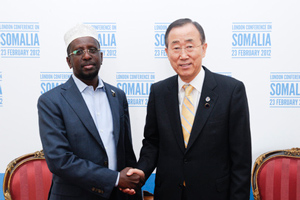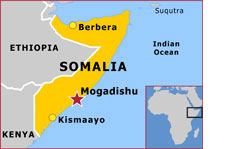Somalia's resources next target of Western intervention?
By Saeed Shabazz -Staff Writer- | Last updated: Mar 14, 2012 - 9:49:30 AMWhat's your opinion on this article?

|

Secretary-General Ban Ki-Moon (right) meets with Sheikh Sharif Sheikh Ahmed, President of the Transitional Federal Government
of the Somali Republic, at the London Conference on Somalia, in London, United Kingdom. Photo: unmultimedia.com
'The West is merely trying to continue to control the resources on the African continent, so what is happening with Somalia is no different than what is happening in the Democratic Republic of the Congo with regards to stealing the resources.' —Omawale Sowere, Publisher of The Sahara Report |
But some say the conference was a forum for the West’s plans to satisfy its growing appetite for military intervention in oil and mineral-rich Somalia.
The Global Policy Forum, a New York-based UN watchdog organization, published a 14-page online report about Somalia which said new interest in the country revolves around “mineral reserves of iron ore, uranium, copper—deposits of natural gas and an estimated 5-10 billion barrels of crude petroleum reserves—estimated worth $500 billion.”
The GPF report acknowledged continuing calls for more force to bring stability to Somalia, but argued such militarized approaches have not ever solved the nation’s problems.
Bill Fletcher Jr. argues the West isn’t concerned with political instability in Somalia. “I don’t think that the West has been concerned that Somalia has been without a central government for the past 20 years,” he told The Final Call.
“It is the terror threat the West fears the most,” he said. “The U.S. has made the situation worse since the administration of the second President Bush. Their efforts to end terrorism in Somalia have succeeded in maximizing the terror threat.”
He offered the example of the Union of Islamic Courts which spearheaded a movement to improve the life of Somalis on the ground beginning in 2006 only to encounter a U.S.-sponsored air and ground attack by the Ethiopian army through 2009.
|
'The Islamic Courts was not a terrorist organization but U.S. used Ethiopia as a surrogate force against them, causing everything to spiral out of control and giving birth to Al-Shabaab.' |
The Islamic Courts was not a terrorist organization but U.S. used Ethiopia as a surrogate force against them, causing everything to spiral out of control and giving birth to Al-Shabaab, Mr. Fletcher noted. Al Shabaab has been labeled a terrorist group by the State Dept. and has been accused of links to Al-Qaeda.

The Gulf of Aden flows into the Red Sea providing an outlet to the West for Persian Gulf oil.
|
The West hid its real intentions behind international politics, UN resolutions, and the need for a humanitarian intervention, he said.
On Feb. 22, former colonial power Great Britain, which held portions of Somali territory during the 19th and 20th centuries, sponsored a UN Security Council resolution which passed unanimously and called on the African Union Mission to Somalia to increase its peacekeeping force from 12,000 troops to 17,731. AMISOM has been in place since 2007.
James Paul, executive director of Global Policy Forum, argues the West will use “pure unadulterated force” to get its way. “The major powers, United Kingdom, U.S. and France, really don’t know about anything else but the use of force.”
Mr. Fletcher doesn’t foresee a NATO-Libya type military exercise in Somalia. “Expect the surrogate armies from Ethiopia and Kenya to perform that function,” he said. However, The Africa Report said in Jan. 2011 that a NATO fleet patrolled the Horn of Africa’s coastline in the war against piracy in the Gulf of Aden.
The Pan African News Wire said Feb. 23 that the Kenyan Defense Forces and the Ethiopian military started their latest invasion of Somalia last October with the White House, the Central Intelligence Agency and the Defense Dept. guiding the operation. The wire service said the U.S., France and Israel have been “directly” involved in the military offensive against Al-Shabaab.
Observers say the West wants Somalia to serve as an outpost for mineral extraction, oil exploration and international trade. The Guardian in an expose published Feb. 21, said the international coalition which was to meet in London, drew up contingency plans in the summer of 2010 and again in 2011 for “over the beach” air strikes against Al-Shabaab and pirate camps inside Somalia.
The Guardian also said U.S. unmanned drone strikes against Al- Shabaab had been taking place for some time. It is believed by some that the British, Dutch, French and Americans would likely support military action, according to the Guardian, using well-armed helicopter gunships.
Mrs. Clinton “bluntly” rejected the call for airstrikes, during the London Conference, saying it was a “bad idea,” according to Reuters. The U.S. lost 18 servicemen in a firefight in the capital city of Mogadishu in 1993 against clan members in which over 1,000 Somalis died. The U.S. forces were part of a UN-sponsored humanitarian- peacekeeping mission.
Omawale Sowere argues Somalia is strategically important in the global war for resources and people need to understand Western interventions are part of a grand scheme to take Africa’s resources. British Foreign Minister William Hague reportedly revealed an underlying economic interest of the West during a Feb. 8 talk, noting 23,000 ships travel through the Gulf of Aden each year. This represents $1 trillion in trade to and from Europe, he said.
The Gulf of Aden flows into the Red Sea providing an outlet to the West for Persian Gulf oil. Reuters reported piracy off the coast of Somalia cost the global shipping industry an estimated $7 billion a year.
A reported response from Al- Shabaab posted at allvoices.comaccused participants in the London Conference of “fostering instability,” and denounced the gathering as a “Western Crusade.” The British Broadcasting Co. quoted an Al-Shabaab spokesman as saying: “They want us under trusteeship and we will not allow that.”
Reuters reported that early Feb. 24, Somali officials said there were airstrikes in Southern Somalia that may have killed three Al- Shabaab fighters. The news service said that it was unclear who launched the airstrikes, but there are suspicions that unmanned U.S. drones were weapons used.
Related news:
Somalia piracy and the untold story (FCN, 04-13-2009)
Somalia: a clear case of ‘blood oil’ in Africa (FCN, 02-05-2007)
Reconnecting the international struggles of Black people (FCN, 07-26-2006)
Annan: U.S. wrong to support warlords in Somalia (FCN, 06-29-2006)
The Oil Factor In Somalia (LA Times, 01-18-1993)
INSIDE STORIES AND REVIEWS
-
-
About Harriett ... and the Negro Hollywood Road Show
By Rabiah Muhammad, Guest Columnist » Full Story -
Skepticism greets Jay-Z, NFL talk of inspiring change
By Bryan 18X Crawford and Richard B. Muhammad The Final Call Newspaper @TheFinalCall » Full Story -
The painful problem of Black girls and suicide
By Charlene Muhammad -National Correspondent- » Full Story -
Exploitation of Innocence - Report: Perceptions, policies hurting Black girls
By Charlene Muhammad -National Correspondent- » Full Story -
Big Ballin: Big ideas fuel a father’s Big Baller Brand and brash business sense
By Bryan Crawford -Contributing Writer- » Full Story






 Click Here Stay Connected!
Click Here Stay Connected!








